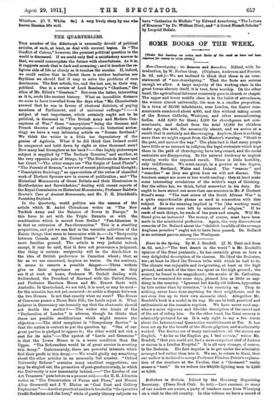MIKE BOOKS OF THE - mum
[1714er this ]backup isr notice mak Book& pt no tad so how ows4 bawl ~rood for rrei•os in °Owl forma
Non-Churchgoing : its Reasons and Remedies. Edited, with In- troduction, by W. Forbes Gray. (Oliphant, Anderson and Ferrier. 3s. 6d. net.)—We are inclined to think that there is an over- statement of " non-churchgoing.." That the facts are serious enough we allow. A large majority of the working class in the great towns absents itself, it is true, from worship. On the other hand, the agricultural labourer commonly goes to church or chapel. The upper and lower middle class is in the habit of attendance, the women almost universally, the men in a smaller proportion. In a town of 36,000 inhabitants, near London, the Easter com- municants numbered about 4,000, and this without taking count of the Roman Catholic, Wesleyan, and other nonconforming bodies. Add 8,000 for these ; 8,000 for churchgoers not com- municants, and deduct from the total 12,000 for children under age, the sick, the necessarily absent, and we arrive at a result that is certainly not discouraging. Anyhow, there is nothing more than we might expect from the Master's warning : " Strait is the gate, and narrow the way." The plain fact is that many people have little or no interest in religion, the legal restraints which kept them in the path of churchgoing have long ceased, and the social restraints are disappearing. So the natural tendency to neglect worship works the expected result. There is little hostility, only indifference. We must except, in a greater or less degree, however, Scotland, Wales and Ireland. The "reasons " and " remedies " as they are given here we will not discuss. The fourteen essays are more or less worth reading : they at least make some interesting revelations of the writer's ways of thinking. But the editor has, we think, failed somewhat in his duty. He ought to have struck out more than one sentence in Mr. F.Herbert Stead's essay. "The vast crime of the South African War" is a quite unpardonable phrase as used in connection with this subject. So is the meaning implied in " he [the working man] reads of immense sums left by ministers of religion." If he reads of such things, he reads of lies pure and simple. Will Mr. Stead give an instance? The money, of course, must have been made in the ministerial profession. Again, the very discourteous remarks of Dr. Ballard about the "childish twaddle of the average Anglican preacher" ought not to have been passed. Dr. Ballard ia an eminent person among the Wesleyans.


























































 Previous page
Previous page